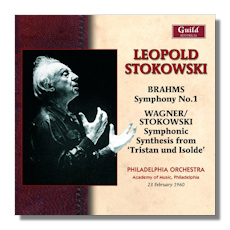
The Internet's Premier Classical Music Source
Related Links
-
Brahms Reviews
Wagner Reviews - Latest Reviews
- More Reviews
-
By Composer
-
Collections
DVD & Blu-ray
Books
Concert Reviews
Articles/Interviews
Software
Audio
Search Amazon
Recommended Links
Site News
 CD Review
CD Review
Stokowski's Return, Part 2

- Johannes Brahms: Symphony #1
- Richard Wagner: Symphonic Synthesis from Tristan und Isolde - Love Music from Acts II and III
Philadelphia Orchestra/Leopold Stokowski
Recorded Live 23 February 1960
Guild GHCD2402 69:07
Last month, Mr. Robert Stumpf II reviewed Guild GHCD2403, which documented Leopold Stokowski's first return to Philadelphia since 1941. While that release arguably has more appeal based on the Russian showpieces it contains, these two sections on the present disc also were cornerstones of the enigmatic maestro's long and illustrious career. Thus this issue can be seen as another important historical document, and essential for fans of this orchestra and conductor.
The Brahms is not a piece – or even composer – that casual fans might associate with Stokowski's artistic temperament, but in fact he programmed this work fairly often. It seems like this, and not Tchaikovsky or Scriabin, was his preferred work for special occasions. In addition to this return engagement, he also programmed it his first appearance with the London Symphony in 1912, and again exactly 60 years later for his 90th birthday in 1972. He also recorded the work with the Philadelphia Orchestra in 1927. It is clear that not only was the score important, but that he was also a tremendous Brahms conductor. Although the sound is less than perfect, you can easily discern that within a few short rehearsals, the old man was able to bring his signature sound back to this great ensemble. And what sounds they make! The work crackles with the sense of occasion, and you can also hear what Eugene Ormandy was proudly able to continue since Stokowski's departure.
The results speak for themselves. Those world-famous strings are in simply glorious form, and the Andante is chilling in its sheer beauty. I don't know if this orchestra can still make this sound, so thank God we've got this to enjoy forever, The allegretto is swift and flows like water. Again, it's the strings that beguile, but those wind solos are nothing to sneeze at either. Stokowski is in a freewheeling kind of mood here, but never does anything feel mannered or so personalized that it disrespects the composer. The brass sound a touch coarse, but the sound is again not top notch, even for 1960, and those soaring climaxes sound a touch flat in nature (though not in pitch, thankfully). No matter. Combined with a pair of tense and urgently paced outer movements, this is electric. In the fourth movement, Stokowski doesn't lean on and milk the main tune as you might expect, and neither does it sound quite as polished as you might expect. But the performance overall is masterly, a great "welcome home" if there ever was one.
The otherwise excellent notes with this disc go on and on about Stokowski's Wagner transcriptions offending the opera-lover's sense of authenticity. Surely, we are past this point? If we aren't, shame on all of us. I was just as unhappy with the notes on ICA Classics that exalted Hans Rosbaud for conducting Debussy in Nazi Germany. Certainly, it's time to move on from all of this extra-musical nonsense. Complaints aside, Stokowski's "controversial" reworking of Tristan is just as valid today as ever, and as music alone, it is almost unfairly beautiful. And really, is there any orchestra in the world better built for this kind of music? Berlin, maybe? I do know that in 1960, the Berlin Philharmonic was not consistently playing with this kind of tonal sheen. For purely glorious noise, this takes the cake, despite a couple unexpected flubs here and there. Even so, the brass chorale was so purely blended that I mistook it for an actual chorus at lower volume, and the strings make some sounds that an orchestra should not be legally allowed to make. This is the real deal, a reminder of how great a man this was, and how wonderfully he and his successor built orchestras. Outstanding.
Copyright © 2014, Brian Wigman





















